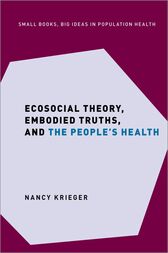-19%
Embracing Embodied Truths: A Revolutionary Approach to Health Justice
Nancy Krieger, a beacon in the realm of public health, unveils an innovative perspective that illuminates the intersection of health justice and the tangible realities of lived experiences. Coined as Ecosocial Theory, this paradigm delves into the profound influence of the environment and societal factors on our physical and mental well-being.
Ecosocial Theory: A Holistic Lens on Health
Ecosocial Theory transcends conventional reductionist approaches by recognizing the intricate web of interactions between our bodies and the worlds we inhabit. It challenges the notion that health is solely determined by individual behaviors or genetic predispositions. Instead, it asserts that health outcomes are profoundly shaped by:
- Environmental factors: Pollution, lack of green spaces, and unsafe housing conditions can impose significant health risks.
- Social conditions: Poverty, discrimination, and lack of access to healthcare and education perpetuate health disparities.
Embodied Truths: Lived Experiences as Data
At the heart of Ecosocial Theory lies the concept of embodied truths. These are the lived experiences of marginalized populations that often go unnoticed or undervalued in conventional health research. By privileging storytelling and narrative, Ecosocial Theory gives voice to the experiences of those who have been historically silenced. These embodied truths provide invaluable insights into the social and environmental forces that shape health outcomes.
The People’s Health: A Collective Imperative
Ecosocial Theory underscores the interdependency of our health. The health of individuals is inextricably linked to the health of our communities and society as a whole. This recognition necessitates a collective approach to health justice, one that:
- Acknowledges the root causes of health disparities: Instead of focusing solely on treating symptoms, Ecosocial Theory seeks to address the upstream factors that perpetuate inequalities.
- Empowers communities: By creating platforms for dialogue and advocacy, Ecosocial Theory empowers marginalized communities to speak out about their health needs and advocate for change.
- Promotes interdisciplinary collaboration: Health justice requires collaboration across sectors, including public health, environmental science, social work, and community organizing.
A Catalyst for Transformation
Nancy Krieger’s Ecosocial Theory serves as a catalyst for transformative change in the field of health justice. It challenges prevailing norms and opens up new avenues for research, policy, and practice. By embracing embodied truths and advocating for collective action, we can create a more just and equitable society where everyone has the opportunity to live a healthy and fulfilling life.










Reviews
Clear filtersThere are no reviews yet.